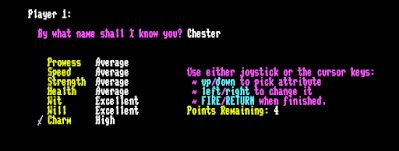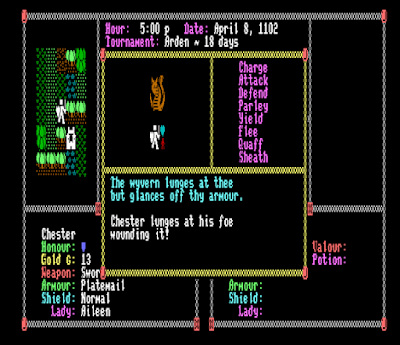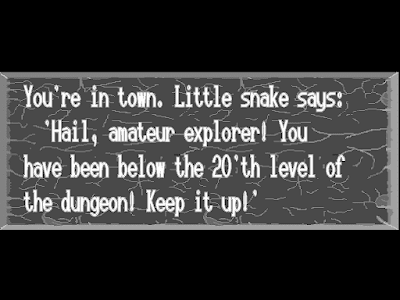Knight's Quest
United States
Independently developed; published by Softdisk (via Loadstar 128 magazine)
Released 1991 for Commodore 128
Date Started: 24 January 2023
Date Ended: 2 February 2023
Total Hours: 6 (not won)
Difficulty: Moderate (3.0/5)
Final Rating: 8
Ranking at Time of Posting: 14/508 (3%)
In my reviews of Spirit of Excalibur (1990) and Vengeance of Excalibur (1991), I talked a bit about my experience with Arthurian romance. It was a passion of mine while I was in college, although it had nothing to do with my degree. I probably spent more time researching the development of Arthurian legends than I spent on the studies I was paying for.
In many ways, the typical Arthurian story is tailor-made for an RPG. Whether you're reading the romances of Chrétien de Troyes, like Lancelot or Yvain, Wolfram von Eschenbach's Parzifal, or the middle sections of the Vulgate and Post-Vulgate Cycles, Sir Thomas Malory, or Edmund Spenser, the stories follow a predictable pattern. There's an inciting event that causes a renowned knight to head off on a "main quest." Said quest is resolved in the end, but along the way, the knight has innumerable random adventures, often with mystical elements. Yvain meets a lion that becomes his companion. Lancelot finds a mysterious pavilion in the forest, intercedes in an act of domestic violence, or escapes a murderous woman who kills knights in their sleep. A temptress tries to get Sir Bors to break his vows of chastity. Pellinore is always after the enigmatic Questing Beast. Even Arthur gets distracted by a hunt for a giant on the way to the Roman War. And in addition to copious tournaments, knights joust with each other just about every time they meet in the field.
Many RPGs evoke the spirit of such legends, but Knight's Quest is perhaps the first to do it literally, with random encounters and side quests drawn directly from Arthurian sources. It appears that author Jon Mattson (a prolific Loadstar contributor who wrote Labyrinth the same year) was as much of a fan of the Arthurian stories as I was. He doesn't set the game explicitly in Arthurian Britain, but the names and themes are familiar. Quest is an independent game, and a diskmag one at that, and there are times that it can't quite meet its goals, but I love the setup and had a great time for a few hours.
The game world and content are highly randomized: Mattson wanted to
create something that he could enjoy playing himself, alone or with his
wife--something with "indefinite replay value." Your first step in
loading the game is to create a game world and name it. The setup
program randomizes the terrain and the locations of cities. You then
start a new game within the game world; you can have multiple games
going within each world. The algorithm used to create terrain could have been more sophisticated. You mostly get a completely random allocation of grass, forest, swamp, hill, and mountain tiles. I've never written such an algorithm, but I think you'd want to give a higher probability of identical terrain occurring in adjacent squares to create larger forests, mountain ranges, and so forth.
Character
creation has you specify a name and then allocate points to seven
attributes: prowess, speed, strength, health, wit, will, and charm. You
start with everything at "average" ability, but you have 18 bonus points
to raise the attributes to "high," "excellent," or even "prodigious."
You can get more bonus points by lowering any attribute to "low,"
"poor," or "dismal." The role of these attributes in the game is a
little ambiguous, particularly since the manual doesn't mention any of
them and you don't see them once the game begins.
 |
| The fictional Chester, like the real one, gets by on wit, will, and charm. |
Two
players can play at once, each with a joystick and half the screen. A
single player game wastes half the screen, in fact. Characters start on
top of a random city with a sword, platemail, a normal shield, and between
one and two dozen gold pieces. Two new attributes appear on the screen:
honour and valour. Honour starts at an average level and valour at a
bottom level. You must seek to improve both. Honour is like a karma
meter and affects how people treat you, while valour is more like an
experience level and affects your combat prowess. Each is depicted by
color, with lighter colors indicating higher values.
Every step the character takes has a small chance of triggering an encounter. Some of the encounters I experienced include:
- Combats with goblins, trolls, ogres, druids, duergars, brigands, wyverns, hydras, and other creatures.
- A "crone" who turned out to be a white witch. She gave me a healing potion. But on another occasion, a crone put me to sleep for 24 hours and stole all my gold.
- A hermit who wanted me to accompany him on a pilgrimage.
- A dwarf who gave me 10 gold to "aid my quest."
- Peasants who enjoyed hearing my tales.
- A wood nymph who seduced me. I lost a couple of days.
- A crystal pool that tempted me to drink. When I did, a water spirit attacked. In the ensuing combat, she dissolved my armor and sword and then cast a spell that made me flee. But on another occasion, a crystal pool healed all my wounds.
 |
| Note that my action is rendered in the third-person but the enemy's is rendered in the second-person. |
- A hermit who invited me to join in his prayers and healed my wounds when I did so.
- A unicorn who healed me and inspired courage.
- A wizard who gave me a magic sword.
- An ogre menacing a lady. I rescued her and she agreed to be my paramour.
 |
| Hasten this way, Aileen. |
- A beautiful lady who seduced me when I was already in a relationship with the woman above. This caused me to lose honor.
Some random encounters lead to quests. You can also get quests in taverns in cities. These are as varied as the encounters above. They often involve combat--ogres or basilisks are menacing a town, for instance. But I also had quests to waken a sleeping maiden and find a hidden treasure in a ruin.
In addition to all these fun Arthurian-style encounters, the game offers another surprise: a jousting simulator. You can engage in jousting when you meet another knight or when you come to a city holding a tournament. In tournaments, you compete against 10 other knights of various experience levels. There are multiple rounds of jousting at tournaments. Sometimes, you get to select your opponents and sometimes they select you. You and your opponent charge at each other across a field, and you have to select a position to aim your lance and a complementary defensive posture. As you win jousts, you gain experience that makes future jousts easier.
 |
| . . . but I didn't do so badly with the defaults. |
On paper, this all sounds wonderful, and I did enjoy my time with the game, but there are a few ways in which Knight's Quest doesn't fully work. First, combat is a bit simplistic and at the same time too hard. When you encounter a potential foe, the game tells you the creature type and disposition; for instance, a goblin who looks hostile, or a mercenary who looks unsure. You have options to attack, threaten, chat, bribe, yield, flee, quaff a potion, or sheath your sword. I found that threaten, chat, and bribe almost always lead to combat with neutral or hostile foes, though friendly ones often stop for a talk, even "monsters" occasionally.
When combat begins, each round you have options to charge, attack, defend, parley, yield, flee, quaff a potion, or sheath your sword. As in many RPGs, "Charge" is supposed to favor offense over defense; "Attack" is a balanced attack; and "Defend" favors defense. In practice, I hardly noticed any difference. Even simple foes take multiple rounds to kill, and the messages come slowly. A modern player can't really crank up the emulator because then it over-reads inputs.
 |
| Trading blows with a wyvern. |
Second, I was not fond of the all-joystick control. I understand why it was necessary, as it's hard to use a keyboard in a simultaneous two-player game, but it was still a little torturous. Everything in the game is quite slow, but increasing emulation speed just causes problems when you have to run the joystick up and down the menus and land on the right command.
The jousting simulator is a nice idea, but I couldn't make it work for me. If I didn't touch anything and just let my character charge at his foes with the default offensive and defensive posture, I had greater success than when I took control and tried to aim the lance.
But the worst problem has to do with exploration. The game has a day/night cycle like the Ultima titles it clearly draws on for graphics. At 17:00, darkness starts closing in. By 19:00, it's pitch dark, and you can't even see the square you're standing in. You don't really want to keep traveling at that point anyway because you and your horse need to rest for 8-12 hours a day to avoid collapsing from fatigue. It starts to get light again at 06:00 and is fully light at 09:00.
Every step takes one hour. Traveling through anything but easy terrain (like grass) takes multiple steps. In practice, this means that you have to stop and sleep every dozen or so moves, which translates to roughly every 20 seconds if you don't have an encounter. That's way too often to have to go through the process of activating the menu, selecting "Rest," choosing the number of hours, and waiting for those hours to pass.
While I love the variety of encounters, they are essentially random. Whether the hermit you meet turns out to be an actual hermit or a bandit, whether the wizard is good or bad, whether the pool of water is refreshing or poisonous, comes down entirely to luck. Building your honor means doing the right thing, though, so you have to deontologically approach every non-hostile creature with open arms and then roll with the punches when they inevitably punch.
More could have been done with the map features. Cities only have three options: visit a tavern, visit a temple, and visit a shop. Shops sell replacement arms, armor, and horses for when they break, get stolen, or get destroyed. They also sell healing potions and buy excess equipment. They pretend to sell magic items but never have any in stock when you ask. Taverns cost 1 gold piece to visit and often have rumors or quests. Temples are a crapshoot: sometimes they provide healing, but other times they just ask you for a donation.
I'm not expecting Darklands in a diskmag game, but it would be nice if there were a few other options, like visiting the governor or king (you can't even proactively do that in the capital, although some quests lead you there), resting at an inn, and so forth. Ruins are similarly wasted. Though they dot the landscape, there's no reason to visit them unless you have a specific quest directing you there.
Character development is mostly lacking. As I mentioned above, you never see your skills again once you set them, and it's unclear if they actually play a role in the game. Increases in honour and valour are supposed to improve your combat abilities, but if this is true, the effect is very subtle.
And finally, while the game's use of color might work for some people, it's not a good interface for a colorblind player. Color tells you where you stand in honour, valour, injury, and fatigue, and there are a lot of variations here that I just can't interpret.
I tried the two-player game for a little while. In some ways, it's an impressive bit of programming. Each player uses one joystick, and while players are moving, it really is like playing two separate games side-by-side. It even handles resting well. When one player rests, the other player can keep moving as the first player remains immobile. The problem comes when either player hits the joystick button to bring up the command list, or when either player triggers an encounter. At that point, the inactive player has to sit and twiddle his thumbs while the active one makes his decisions, fights his combat, or whatever. The manual doesn't suggest that players can meet, help each other in combat, fight, or trade equipment, so I'm not sure what the point is. (I suspect that if they both show up in the same city on tournament day, they can participate in the same jousting tournament, but it would have taken a long time, trying to control two characters at once, to confirm it.) I think I'd rather just play a regular CRPG and trade turns. When I was a kid, my friend and I used to play "until someone dies," which really added some consequence to death that I haven't experienced since except in permadeath games.
 |
| Two players can move simultaneously, but they can't do anything else simultaneously. |
Some other notes:
- Sound is limited to looping musical tracks consisting of medieval-ish public-domain tunes like "Greensleeves." It's well done, but it gets (to me) repetitive.
- You never kill foes; you "incapacitate" them.
- Some of the quests seem to be broken and do not trigger events when you arrive at the given destination. For instance, someone might tell you that ogres are menacing Durham, but when you get to Durham, nothing happens.
- You can only have one active quest at a time. If you forfeit a quest to take another one, you lose honor.
- Every randomly-generated map randomly chooses a city as the capital. City names are drawn from real English (or European) places and some Arthurian characters: Arden, Sherbrook, Bedigraine, Durham, Bristol, Newcastle, Stafford, Brandegoris.
- The economy is pretty tight. You can loot enemies post-combat, but hardly anyone ever has anything. Potions go quickly, and some encounters strip you of gold. If nothing else, you can build honor by donating to temples.
- If a lady agrees to be your paramour, she'll tell you what city she lives in, and you can visit her there. She occasionally will then have news of an upcoming tournament or quest.
There is a "main quest" in the game. It's supposed to be triggered when your honour and valour rise so high that both icons are white. You then visit the ailing King Morgan and get a quest that leads you to become his heir. Unfortunately, I can't seem to reach this point because of a final problem, probably having to do with emulation rather than the original game. You can save at any point outside of combat, but I find that after a certain amount of time playing a character, the game freezes when you try to save. Even if you could avoid that, it also occasionally crashes from random keypresses.
Normally, I'd use emulator save states, but I can't get save states to work for the Commodore 128 in VICE. I couldn't get them to work for Labyrinth, either. They seem to save all right, but when I load them, nothing happens. I've tried both regular and "quick" save states, and I've tried the options that have you embed the disk and ROM with the save state, but nothing seems to work. I'm not sorry that there aren't more Commodore 128 exclusives, as I almost always have trouble with the emulation. But thanks to commenter Tristan Miller for alerting me to this game and helping me with the configuration; without him, I wouldn't have gotten this far. I'm still a little fuzzy on the distinction between PAL and NTSC and why some games only work when I have "true drive emulation" enabled, some only work when I don't, and some only work when I have it enabled on autostart but not regularly, or vice versa.
I have some options that I'm going to experiment with. (Please, I am explicitly not asking for help from anyone at this point). This is really a one-entry game, but it has enough original ideas that I want to try a bit harder and experience more of it before rating it.
*****
Edit from 2 February 2023: I continued playing for a few hours and tried some different versions of the disk dump, but they all had the same problems above, plus some new ones, such as quests being given for cities that did not exist on the game map. I'm going to have to call it "not winnable" except by a lucky player who never has to save and doesn't encounter any of the quest bugs. It get a relatively high 27 on the GIMLET, with 2s, 3s, and 4s in most categories except for "Graphics, Sound, and Interface," where I gave it a 1 for only modest graphics, no sound except music, and a horrid joystick interface.
Time so far: 4 hours












































